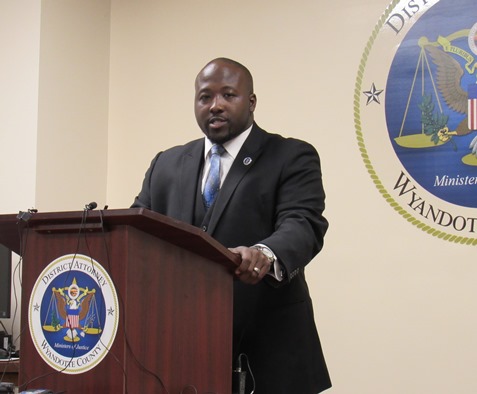
In a very emotional sentencing today in Wyandotte County District Court, Jamaal R. Lewis, 22, was sentenced to life in prison for killing police Capt. Robert (David) Melton.
The life sentence carries the potential of parole after 25 years. Lewis also was sentenced to 13 months for aggravated assault and nine months for discharging a firearm, to run consecutively to the 25-year-sentence. Lewis pleaded guilty to killing Capt. Melton, 46.
Melton was looking for suspects in a drive-by shooting near 15th and Rowland at the time he was killed.
Judge Wes Griffin told the family and around 100 persons who crowded into the courtroom, many of them wearing law enforcement uniforms and supporting the Melton family, that he was required to follow the state’s sentencing guidelines. He could not depart from the guidelines. He sentenced Lewis to the maximum sentences under the guidelines, to run consecutively.
Family members who testified today stated they felt that justice was not served by what they considered a light sentence.
John Melton, brother of the slain Kansas City, Kansas, Police Department captain, said he believed Lewis should not be eligible for parole at any time. In an interview after the sentencing, Melton said he didn’t think the sentence was just. Melton said he did some research and discovered that a police dog’s killer got 22 years.
He said probably the best thing that happened today was that the judge set the other sentences to run consecutively to the murder sentence. He added he did not blame the judge. He said he hates the word closure, but he hopes he doesn’t have to see his brother’s face on TV any more.

Several members of the Melton family and friends addressed the court at the sentencing, their voices breaking at times as they talked about the loss of their relative.
Police Chief Terry Zeigler talked about the effect of the murder on the entire police force. Besides serving with the Kansas City, Kansas, Police Department, Melton had served with the Wyandotte County Sheriff’s Department and with the National Guard in Iraq and Afghanistan, and had received the Bronze Star.
Lynn Melton, sister-in-law of Capt. Melton, told the court that she had researched the issue and this sentence was the lightest one she had seen for someone who had killed a law enforcement officer.
“Our hearts hurt,” one speaker told the court. Some other family members and friends expressed their anger, and some criticized the district attorney’s handling of the case.
Lewis sat nearby in a striped jail jumpsuit, handcuffed, and looked down or away from the speakers. Lewis did not address the court, and did not offer any statements at all.
Dupree explains his position

District Attorney Mark Dupree today called for a change in state laws. Kansas does not have a law requiring mandatory life sentences without parole for the killing of a law enforcement officer, while other states have that law. Dupree said he is asking state legislators to add that law.
Dupree, who held a news conference after the sentencing, had earlier said he could not comment on the case while it was in court. There was a court order in this case, filed on July 26, 2016, preventing him from discussing it while it was in court. There also are ethics rules advising against commenting on cases that have not been completed.
Lewis was originally charged with capital murder for the July 19, 2016, slaying of Capt. Melton, but felony murder was added to the charges, and Lewis pleaded guilty to felony murder.
“We lost a dedicated public servant, a military veteran, a father, a brother, a friend, a colleague, a wonderful human being,” Dupree said at the news conference. “Our community was shattered by the death of Capt. Melton. Today the individual responsible for his death was sentenced to life in prison.”
Dupree said the laws are flawed and do not always allow them to achieve the level of justice that is due, but they work to do their best.
“We set out to remove the individual responsible for the death of Capt. Melton for as long as possible,” Dupree said. “That was achieved through the life sentence handed down today.”
Dupree said competency hearings in this case took almost a year. As a result of those proceedings, it became clear that a death sentence was unlikely, he said. A Supreme Court ruling does not allow the death penalty for those with intellectual disabilities, he added.
Dupree said a key element of the case was premeditation, and a jury might not have agreed that the crime was premeditated. He said the law requires more than the instantaneous taking of another’s life.
“The law enforcement officer who witnessed Capt. Melton’s murder described the shooting as occurring, ‘instantly, almost immediately,’” Dupree said. In this case, there was no chase, no sirens and lights were not on, and there was an unmarked car, he said.
The car approached Lewis from behind as Lewis was walking down the street and quickly turned into the walking path of Lewis, Dupree said. Lewis then fired multiple shots into the vehicle, tragically ending Capt. Melton’s life, he said.
“If the jury did not agree that the shooting was premeditated, the consequence would be a sentence of 12 to 14 years, based on his lack of criminal history, under the Kansas sentencing guidelines. The result would be wholly unacceptable, as there was overwhelming evidence to support the charge of felony murder.”
Dupree said he made the decision, after speaking with experts, law enforcement officers, experienced attorneys employed by his office, a former police officer and a retired FBI agent. Dupree then filed the charge of felony murder in order to ensure a life sentence at trial, he said.
“Given these facts, we had to do what we could do to ensure a life sentence,” Dupree said.
The felony murder consisted of shooting into an occupied vehicle, and death occurred, he said. This equals a life sentence, he said. If the jury could not agree the act was premeditated, he could still achieve a life sentence, he said. The gun belonged to the defendant’s mother, and he was positively identified by the witness as the shooter, he said.
The defendant came into court and said he was guilty as charged, Dupree said. The judge informed the defendant that his guilty plea carried a mandatory life sentence, he said. The court accepted the defendant’s plea of guilty as charged, he added.
“There was no plea agreement, there was no negotiations of a plea, and there is no 25 years,” he said. “There is only a life sentence. It is true that in 25 years, this person who murdered one of our officers will be able to ask one question to a state parole board. That question is, can I be released? I am confident that no person in this community will stand for his release, ever.”
To his knowledge, no person who received a life sentence in Kansas for killing a police officer has ever been released from prison, Dupree said.
“This office and every member of the law enforcement community will be sure never to forget Capt. Melton’s sacrifice and ensure the defendant receives the entire life sentence he received today,” he said.
Dupree said he is advocating for a law that makes the intentional killing of a law enforcement officer a mandatory life sentence without parole.
Without this law, premeditation must be proven without a doubt, he said. There is a far lesser sentence when that cannot be proven, he said.
“The evidence in this case highlights what I believe is a flaw in our current law,” Dupree said. “It is imperative that we do all we can to do justice for law enforcement who pay the ultimate price, as well as their families, for they are the heroes who make the sacrifices to ensure our safety, and for that, we all are grateful.”
Dupree said in the Lewis case, there was never a negotiation for a plea. Some of the facts were not known at that time that comments were made earlier, he said. A clerical error had no effect on the case, he said.
“I need them and they need me, and we have to work together,” Dupree said. “It (our only job) is about making sure our community is protected and our public is safe. The more we get on our soapbox with fighting and disagreeing with each other is the more we are taking away from what our jobs are together, which is protecting our community.”
